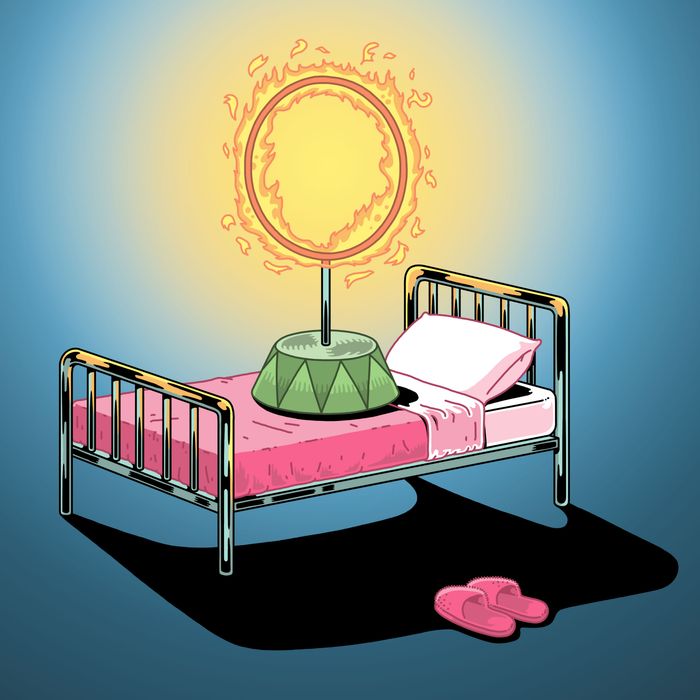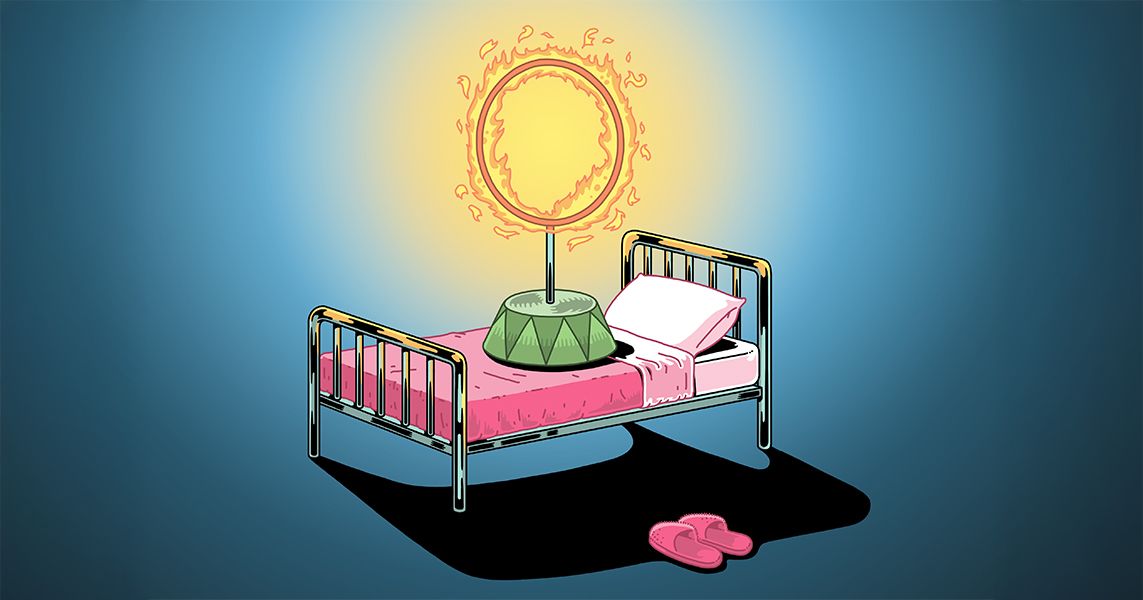
Illustration: Olivier Heiligers
When my alarm goes off each morning, it feels like the end of the world, which to a certain extent it is. At least the next installment of the end. I hold my phone in my left hand, where I’m wearing an Oura sleep-tracking ring on my index finger; launch the Oura app; and wait for the ring to tell my phone how it thinks my night went. I look at my “Sleep Score,” which sometimes has a little crown logo over it, like the Oura’s version of a thumbs-up. There’s a “Readiness” score too. That one is especially unpredictable — sometimes high, sometimes low, seemingly unrelated to how much sleep I’ve actually had and my overall sleep score. My results are mildly alarming and a little encouraging. Mostly, they are a puzzle to solve.
I had been trying to make sense of this data for a good six months when I decided to bring it to a few sleep-medicine experts for advice — a choice that, it seems, many Oura Ring users ultimately make. “Just last month,” Emerson Wickwire, the section chief for sleep medicine at the University of Maryland Medical Center, told me, “a patient began our discussion by offering to show me volumes of sleep-tracking data that she had been poring through over many months. And in situations like that, not only is sleep-tracking data not helpful, sometimes it can actually be harmful.” He believes that “becoming overfocused on sleep can be a problem in and of itself.”
Drawing on sensors that include LEDs shining through the skin, the Oura app tracks heart rate, respiratory rate, and blood oxygen saturation, plus the variation of the heartbeat — a number the Oura system seems to care deeply about. In my app, there’s always a red or pink warning bar for “deep sleep.” According to the ring, on most nights I spend less than 10 percent of the night in “the most restorative and rejuvenating sleep stage,” when the brain “flushes out amyloid proteins that are a hallmark of Alzheimer’s,” according to the New York Times.
My timeline also has white spikes representing the moments in the night when I woke up. When I look at these, interruptions that I’d barely registered at the time snap into focus: my neighbor on the other side of our bedroom wall having a loud, ripping coughing fit; my cat scratching at our leather bedside bench; my firstborn rattling around the apartment, procrastinating on college-application essays; an almost inaudibly low-pitched mechanical roar throbbing from somewhere nearby, strong enough to make a heavy painting add its own chattering sound as it shakes against the wall. What should have been fleeting, forgotten mysteries became things I feel like I am responsible for. If the ring knew about those things, I wanted to know what else it might be able to glean.
Self-tracking technology, the digital-sociology scholar Martin Berg of Malmö University wrote in 2017, when the Oura Ring was new, reflects a “widespread late modern ‘ontological insecurity.’” It “only makes sense in a social context where external factors make it difficult for people to trust their personal experiences, and where they carefully have to strive at keeping a ‘balance’ in their lives.” I was asking the ring to help make me more effective at the all-important task of resting — a task that humans have never been able to monitor themselves.
But sleep stages are defined by what happens in the brain, not on the finger, sleep experts I asked about my deep-sleep readings told me. In lieu of attaching an electroencephalograph, the way a real polysomnography test in a sleep lab would, a home tracker approximates the state of the brain with a motion sensor. “If somebody moves a little bit, they’re probably in light sleep,” Dr. Daniel Barone, the associate medical director of the Center for Sleep Medicine at Weill Cornell Medicine, told me on the phone. “If they move a lot, they’re probably awake. If they don’t move at all, they’re probably in deep sleep.”
Barone said he’s more interested in a patient’s subjective experience upon waking than in what happens when they’re actually asleep. “So if they say, you know, ‘I wake up, I feel fine, but geez, my Oura Ring says I don’t get deep sleep,’ I would say, ‘Take the Oura Ring and throw it away.’”
“We think about sleep duration, sleep quality, and sleep timing,” Barone added. “And trackers can be pretty good at sleep duration. They can be pretty good at sleep timing. Sleep quality? Relatively not as good as the first two.” If patients are consulting a tracker to see how well they’re sleeping, he said, “I encourage patients to take those sleep-quality metrics with a grain of salt.” But that advice collides with the sheer persuasive force of scores and charts on a screen, and even with some scientific research on sleep.
Objectively, the basic difficulty with my sleep was obvious from a glance at the Oura’s calendar view: My little blue crowns — for solid rest — were clustered around weekends and school holidays. The number that kept bringing me down was the simple arithmetic the ring insisted on doing between the time I lay down and the time I got up. The glib, excuse-making front of my brain likes to believe that basically 11:30 p.m. — 11:50, even — is the same as 11. When the alarm goes off at quarter past six the next morning, though, the back of my brain and the Oura app both know seven hours haven’t gone by.
The underlying facts make the effects of my approximate math even worse. The American Academy of Sleep Medicine recommends seven to eight hours of sleep per night, but Wickwire told me this means at least seven hours of actually being asleep, not seven hours from when you crawl under the covers till your last snooze alarm runs out. “Even if my sleep efficiency is high,” Wickwire said, “I’m still awake 10 percent of the time. So if you spend seven hours in bed, you’re still awake for 42 minutes of that. So that means you’re down to six hours and 18 minutes, which is chronic sleep loss.”
And though experts recommend cross-referencing sleep-tracker results with your subjective feeling, subjective feelings can deceive you too. Wickwire told me about an experiment in which subjects went through a week of artificially shortened sleep and tested to measure their sleepiness as it increased day by day. “However,” he said, “in addition to the objective measures of sleepiness, participants were also asked their subjective sleepiness, and those scores didn’t change. Even though people were falling asleep faster and faster and faster every single day, they were not rating that their sleepiness was going up.”
“Humans are very poor estimators of their sleep-related impairment,” he said. “Even losing a single hour of sleep can degrade cognitive performance the next day.”
I was getting seven or eight hours maybe once or twice per weekend. The rest of the time, the log for the week might read 5h17m, 6h31m, 5h40m, 5h29m, 5h38m. My cheery readiness scores were cheery only because the ring had concluded that the time span between when I usually got to bed and when I usually got up was just naturally how much I was meant to sleep: My “sleep regularity” and “sleep balance” registered as good because there was nothing better to compare them to. The Oura had no idea that my everyday schedule — and my sleep environment, complete with a cat and teenagers and a noisy apartment building — was inimical to a solid night’s rest.
So was the rest of the world. One late January morning, on my way up to the surface from smooth depths of dreaming, the first thing my mind recalled was a news story about an apparent murder commune of rationalists, and then I remembered the Army helicopter hitting the passenger jet. Yet somehow my readiness score was an 86.
“Would you feel like treating yourself with something fun today?” my Oura asked.
A few days later I did, though not because the app suggested it. I went out and met my oldest friend in the city and had two nice pints of beer. I mistimed the schedule so I couldn’t eat dinner till I got back home afterward, and then I had to help fill out a college financial-disclosure form: alcohol, a late meal, and anxiety — three tags from the list the Oura offers people who want to classify what might have lowered their scores. Maybe it was the beer, but for the first time in a long time, I didn’t worry about whether “mistakes” would sabotage the slumber that lay ahead. I tossed and turned a little … and then slept deep, calm, undisturbed sleep until a few minutes before my alarm went off. The ring gave me a 91 for sleep with abundant deep-stage sleep. My readiness was a paltry 79.
Subjectively, I could feel my actual mood borne aloft through breakfast.
Sign Up for the Intelligencer Newsletter
Daily news about the politics, business, and technology shaping our world.
Vox Media, LLC Terms and Privacy Notice
Related
